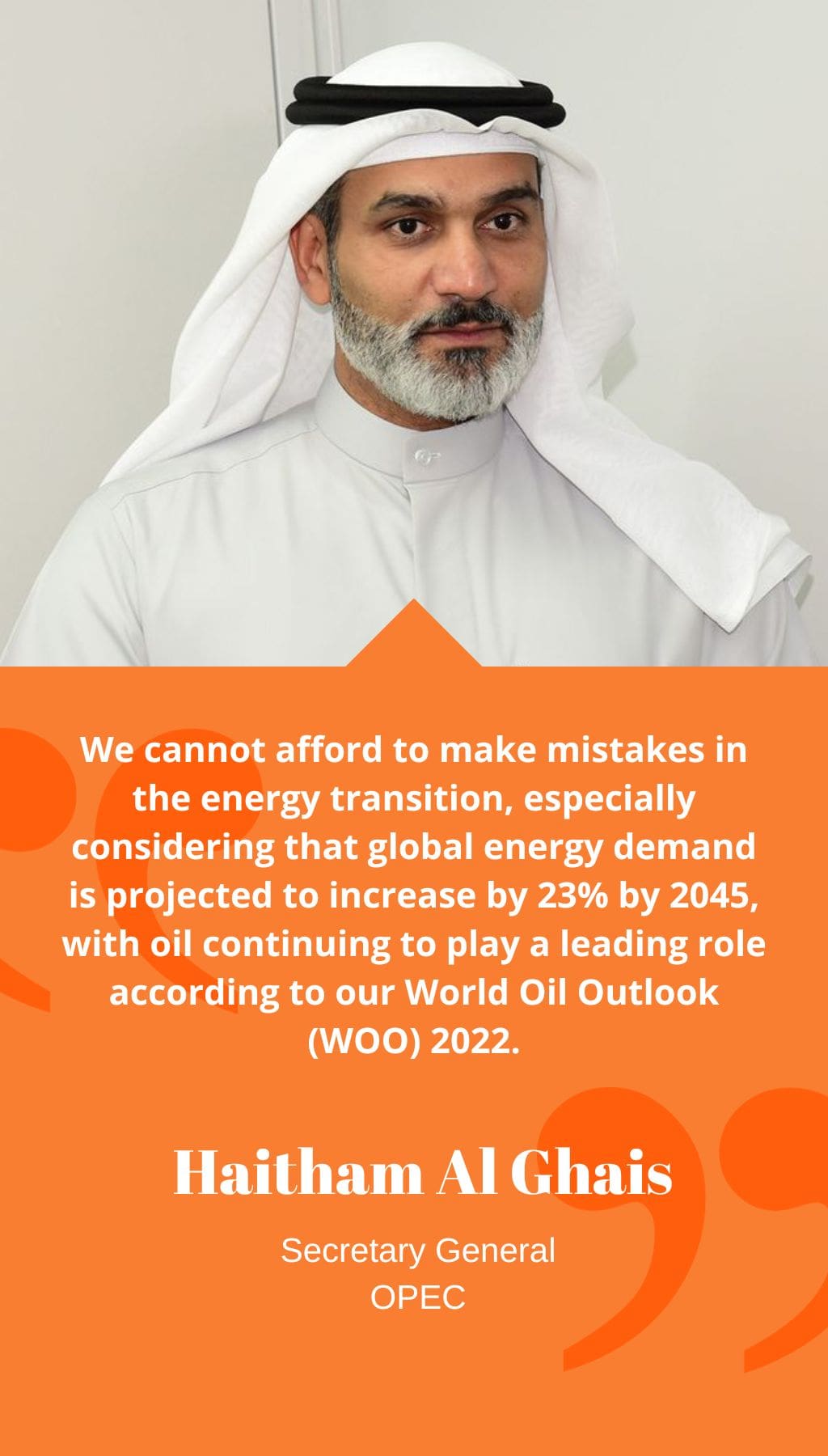
- Kuwait | 15 June 2023

What are currently the major challenges and priorities for OPEC?
The key priority for OPEC and its partners in the Declaration of Cooperation (DoC) is to ensure a balanced and stable market that benefits both producers and consumers. The OPEC Secretariat closely monitors the market outlook on a daily basis, which is crucial in the dynamic current market environment. This approach supports our decision-making process, ensuring transparency, adaptability, and long-term guidance. Challenges arise from the complex interplay between energy affordability, energy security, and emissions reduction. We have witnessed these challenges worldwide in 2022. It’s important to recognize that there is no one-size-fits-all approach to the energy transition. Embracing all energy sources, technologies, and people is a priority. We cannot afford to make mistakes in the energy transition, especially considering that global energy demand is projected to increase by 23% by 2045, with oil continuing to play a leading role according to our World Oil Outlook (WOO) 2022.
What particularly impactful solutions have been implemented among OPEC members using digital tools and strategies?
Digitalization has always played a crucial role in our industry, and OPEC member countries are leveraging digital tools to cut costs, enhance efficiency and productivity, reduce emissions, optimize asset availability, and add value. Technologies such as the Internet of Things (IoT), blockchain, artificial intelligence (AI), and data analytics are being utilized to streamline downstream oil and gas supply chains. Autonomous machines, robotics, and advanced exploration tools are enabling access to previously challenging upstream deposits. Digital solutions are also helping with preventive maintenance, detecting and reducing emission leaks, and improving the sector’s environmental footprint. Furthermore, they hold great potential for the circular carbon economy (CCE), an area actively promoted by many OPEC member countries.
In the World Oil Outlook 2045, OPEC highlights the challenges faced by developing economies heavily reliant on oil production. What strategies and tools can these countries employ to address the climate crisis while safeguarding their essential economies?
When addressing climate action and developing environmental policies, it is essential to consider the unique circumstances and capabilities of each country, including those with significant oil resources. At OPEC, we firmly believe that the resources and expertise of the oil industry can be harnessed to develop cleaner and more efficient technological solutions. Our strategy focuses not only on emission reduction but also on meeting future energy needs. Carbon capture utilization and storage, direct air capture, blue hydrogen, and other technologies can be leveraged to achieve this. These innovative approaches offer broader benefits not only to resource-rich countries but to the entire world, ensuring an inclusive, just, and sustainable transition. The future of energy can be summarized in three key points: ensuring energy affordability for all, transitioning to a fairer and equitable world where universal access to energy is realized (UN Sustainable Development Goal 7), and reducing emissions. OPEC member countries are fully committed to these objectives, as demonstrated by initiatives like the Saudi and Middle East Green Initiatives, which prioritize climate action, energy security, and economic prosperity.
Could you elaborate on the importance of the MENA region’s oil production output in safeguarding the stability of global energy consumption in the coming months and years?
OPEC member countries are committed to maintaining stability and adequate oil supply in the global market while making the necessary investments to meet future demand. The proactive decision by the DoC in October 2022 to reduce production by 2 million barrels per day (mb/d) from November 2022 proved to be the right course of action in stabilizing the market. This decision also created additional spare capacity, primarily in the MENA region, to address any unforeseen events. The analysis and data provided in our Monthly Oil Market Report have proven to be reliable indicators of market developments. In terms of investment, Kuwait aims to reach 4 mb/d, Saudi Arabia targets 13 mb/d, and the UAE aims for 5 mb/d. Iraq and Iran also have significant potential, while Algeria and Libya present opportunities as well. The region is also witnessing significant expansion in downstream capacity, exemplified by projects like the Al Zour refinery in Kuwait. However, it is crucial to note that the investment challenge extends globally, with insufficient investment across all energy sectors. The oil industry alone requires USD 12.1 trillion in investment between now and 2045, averaging over USD 500 billion annually. All industry stakeholders must collaborate to create a sustainable and investment-friendly environment that benefits both producers and consumers, as well as developed and developing countries. Addressing this challenge is vital to ensure long-term energy security and prevent future energy crises.
What expectations and priorities does OPEC have for 2023?
Vigilance remains paramount for OPEC as we navigate the uncertain landscape. While some optimism exists, we are mindful of various uncertainties such as persistent high inflation, potential monetary tightening measures, rising interest rates, changes in China’s COVID-19 policy, and geopolitical conflicts in Eastern Europe. OPEC and the DoC will closely monitor any evolving market dynamics through regular meetings, ensuring a comprehensive understanding of the oil market. This agile approach provides reassurance to the market. One major priority for OPEC in 2023 is the eighth OPEC International Seminar scheduled for July 5-6. The seminar, themed “Towards a Sustainable and Inclusive Energy Transition,” aims to foster cooperation and dialogue among energy stakeholders by facilitating discussions on critical issues affecting the petroleum industry. We anticipate a memorable and informative event in Vienna, welcoming participants from around the world.














